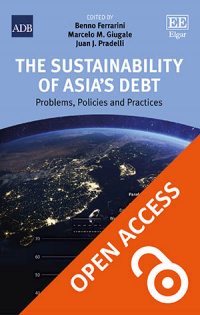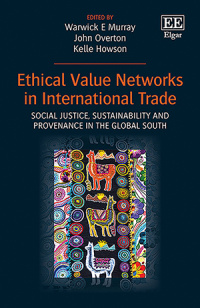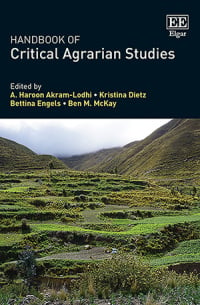
Hardback
减少亚洲的贫困
生长,瞄准和测量中的新出现问题
9781843762645 爱德华伊利加出版社
在这本书中,一群尊贵的作者解决了三个广泛问题:广泛的策略和宏观经济政策最佳支持亚洲的减贫努力;什么职位应该针对无人干预扮演,以及如何设计这些干预措施;如何测量贫困,需要新方法,以及测量如何影响我们对贫困的理解。这三个广泛主题中的每一个也被认为是在审查亚洲和太平洋的许多国家的贫困情况下。
More Information
备受好评
Contributors
Contents
More Information
在这本书中,一群尊贵的作者解决了三个广泛问题:广泛的策略和宏观经济政策最佳支持亚洲的减贫努力;什么职位应该针对无人干预扮演,以及如何设计这些干预措施;如何测量贫困,需要新方法,以及测量如何影响我们对贫困的理解。这三个广泛主题中的每一个也被认为是在审查亚洲和太平洋的许多国家的贫困情况下。
The book represents a major scholarly contribution of the Asian Development Bank to the literature on poverty in the region it serves. The organization adopted poverty reduction as the principal objective of its lending in 1999. This book will be of interest to scholars and students of development economics and Asian studies, and will be useful reading for policymakers and development practitioners working in national, international or nongovernmental organizations.
A Joint Publication with the Asian Development Bank
The book represents a major scholarly contribution of the Asian Development Bank to the literature on poverty in the region it serves. The organization adopted poverty reduction as the principal objective of its lending in 1999. This book will be of interest to scholars and students of development economics and Asian studies, and will be useful reading for policymakers and development practitioners working in national, international or nongovernmental organizations.
A Joint Publication with the Asian Development Bank
备受好评
“编辑的收集提供了周到和最新的分析,从理论和经验的角度来看,他们对亚洲贫困的理解显着提高了。”
– Ugo Pica Ciamarra, Progress in Development Studies
“这是由尊贵的作者提供丰富的论文。。。本书显然有助于对亚洲贫困的实证理解,并在设计亚洲的减贫战略方面可以争辩和更好地了解。对于政策制定者和发展经济学和亚洲研究的学者肯定是重要的阅读。
– Vivi Alatas, Bulletin of Indonesian Economic Studies
– Ugo Pica Ciamarra, Progress in Development Studies
“这是由尊贵的作者提供丰富的论文。。。本书显然有助于对亚洲贫困的实证理解,并在设计亚洲的减贫战略方面可以争辩和更好地了解。对于政策制定者和发展经济学和亚洲研究的学者肯定是重要的阅读。
– Vivi Alatas, Bulletin of Indonesian Economic Studies
Contributors
Contributors: A. Asra, A.M. Balisacan, K. Basu, P. Cashin, C.M. Edmonds, S. Kelegama, A.R. Kemal, S. Lall, C. Lightfoot, P. Mauro, D. Mazumdar, V. Naidu, C. Pattillo, G. Pyatt, A.J. Ryan, R. Sahay, V. Santos-Francisco, R. Sudan, E. Thorbecke, J. Weiss
Contents
Contents: Foreword by Tadao Chino Introduction Part I: The Macroeconomy, Globalization, and Pro-Poor Growth 1. Marginalization in a Globalizing World: Some Plausible Scenarios and Suggestions for Measurement 2. Balanced Development: An Approach to Development Policy and Priorities 3. Poverty Analysis and Measurement within a General Equilibrium Framework 4. Macroeconomic Policies and Poverty Reduction: Stylized Facts and an Overview of Research Part II: Targeting Urban or Industrial Sectors 5. New Technologies, Competitiveness, and Poverty Reduction 6. Use of Information Technology for Poverty Reduction: A Case Study of Efforts in the Indian State of Andhra Pradesh 7. Small and Medium Enterprise Development in Equitable Growth and Poverty Alleviation Part III: New Developments and Issues in Poverty Measurement 8. Poverty Lines: Eight Countries’ Experiences and the Issue of Specificity and Consistency 9. Poverty Comparison in the Philippines: Is What We Know About the Poor Robust? 10. Assessing the Poverty Impact of Policy- and Sector-Based Lending Part IV: Country Studies 11. Pathways of Poverty Reduction: Rural Development and Transmission Mechanisms in the Philippines 12. Structural Adjustment, Macroeconomic Policies, and Poverty Trends in Pakistan 13. The Poverty Situation and Policy in Sri Lanka 14. Pacific Islands: Is Poverty an Issue? 15. Opening Doors to More Inclusive Societies: The Case of the Pacific Island Countries Index




